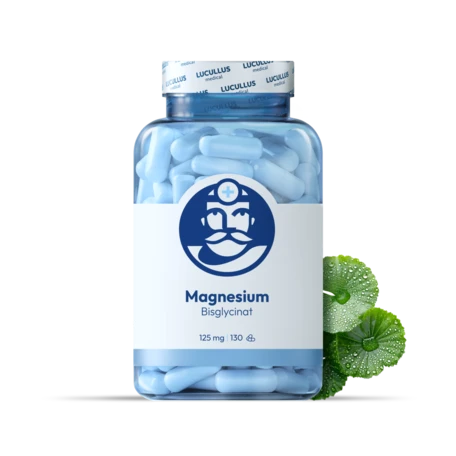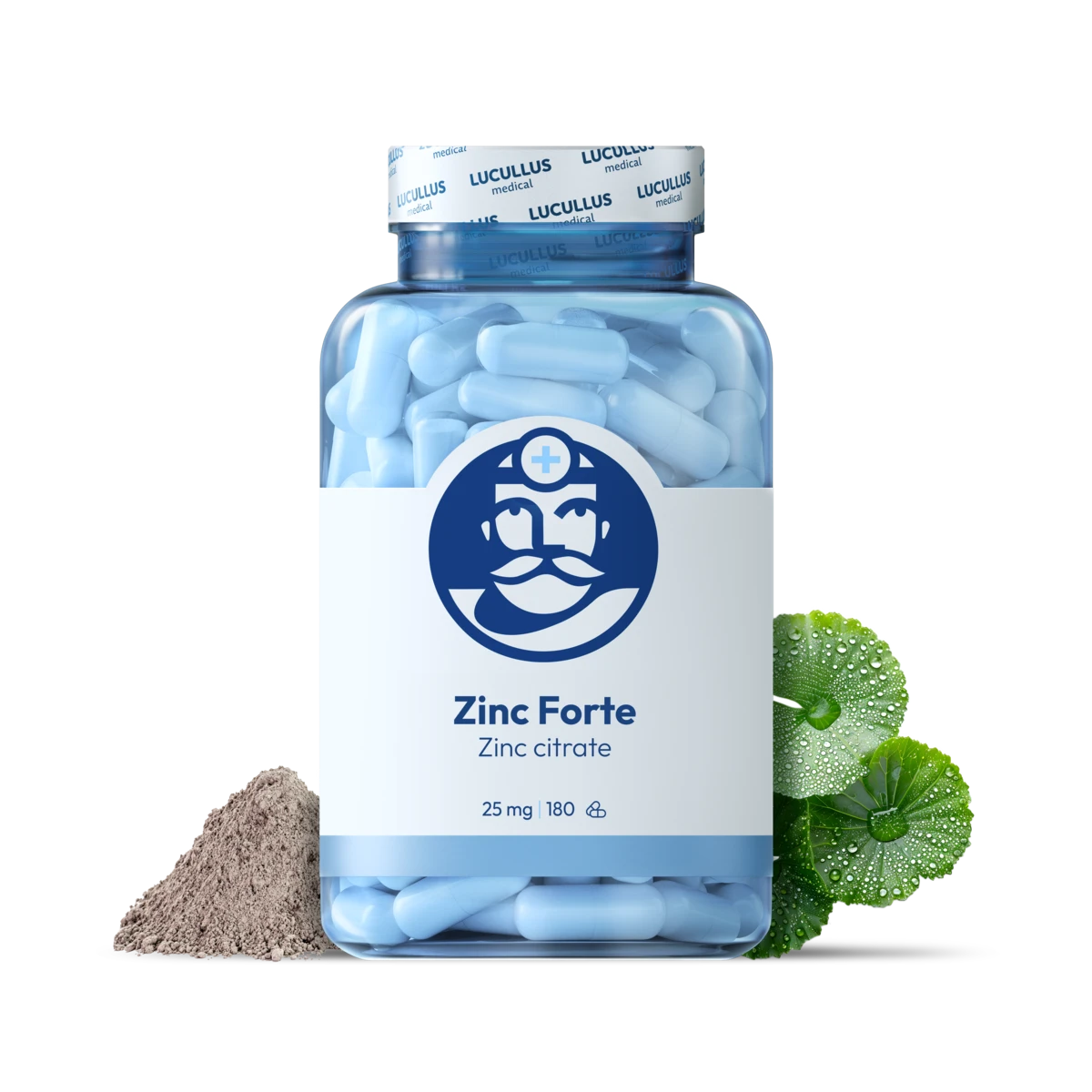
Účinky
Excellent absorption and bioavailabilitySupports optimal muscle function and recoveryImproves nervous system healthSupports strong bones and teethHelps cardiovascular health
Pack of 60 capsules
Pack of 180 capsules
| Active ingredient | In daily dose | % Ref |
|---|---|---|
| Zinc (zinc citrate) | 25 mg | 250.00% |
Ingredients: Zinc citrate, bulking agent: microcrystalline cellulose, capsule made of gelatin.

I take these capsules every day and I feel much better. My skin is healthier and wounds heal faster.
Zinc Forte has helped me with antioxidant protection. I am less tired and have more energy during the day.
Zinc Forte - Zinc Citrate has helped me a lot to strengthen my immune system. I recommend it to anyone who wants to improve their resistance to disease.
Excellent product! I have noticed an improvement in my cognitive function. Perfect for daily use.
I have been using Zinc Forte for a month now and have noticed a significant improvement in my skin health. I like that it's easy to take every day.

In each of our recipes, we invest in research to identify the right ingredients, compounds, and doses to achieve real benefits. We then manufacture our unique recipes in the most modern facilities in Slovakia.
It is necessary for many biochemical reactions, increases immune function, accelerates wound healing, ensures skin and hair health.

Read the latest news about quality dietary supplements, vitamins, immunity, and health.

Podpora imunity, ktorá obsahuje potrebné vitamíny a minerály v dennej dávke. Práve oslabený systém zhoršuje kvalitu života, tým že odoláva infekciám. Prvotnými príznakmi oslabenej imunity môže byť už to, že sa dozviete pri každej príležitosti, alebo často opakujete stále antibiotík, zvýšená únava, zápal močových ciest, kožné problémy, bolesti hlavy a mnoho ďalších. Pravidelnou konzumáciou 15 vitamínov/minerálov v multivitamínovom komplexe Dr. Lucullus zabezpečíte všetko, čo Vaše telo potrebuje, vytvoríte si ochranu vášho zdravia a pohody.

Cordyceps sinensis - to je náš zombie predátor. V Číne ju volajú "v zime hmyz, v lete byliny". Predstavte si hubu, ktorá pri rozmnožovaní v lete vystreľuje svoje spóry (semeno) a to sa uchytí na tele hmyzu. Postupne prerastá jeho telo a parazituje na ňom, postupne ho zvnútra doslova zožerie, pričom hmyz naďalej žije, mení sa aj jeho vonkajšia podoba ale naďalej zháňa potravu, až kým nezalezie pod zem, kde uhynie a mumifikuje sa. Huba v ňom dokáže prežiť aj dlhšie obdobie. Huba doslova ovládne telo hostiteľa, v lete z jeho tela vyrastie, vytvorí štíhle "paličky" vysoké 5-20cm. Toto inšpirovalo sériu videohier Last of Us kde huba Cordyceps urobí z ľudstva zombíkov. V reálnom živote sa táto videohra odohráva v skutočnom živote hmyzu. Obeťami sú larvy motýľov, veľké mravce, pavúky...

Excessive hair loss, slowed growth, or premature graying can have various causes, with diet playing a major role. Para-aminobenzoic acid (PABA), also known as vitamin B10 (although it is not officially a vitamin), is among the significant nutrients that support hair health, skin, and overall vitality of the body. Additionally, it can influence the aging process. Despite its beneficial effects, it is less known today, although in the past it was considered almost a miraculous means of maintaining youth. In the 1950s, scientists studied PABA for its potential in combating degenerative diseases and recorded cases where graying was slowed down.

“Is it just another vitamin... or?” one might think, but the more we learn about pantothenic acid, the more it fascinates us. Vitamin B5 plays a crucial role in converting food into energy, supports concentration, mental well-being, and even skin regeneration. Without it, the body would not be able to properly produce hormones or fight stress. It is also a substance that is hidden in every cell of our body, accompanies us from birth, and contributes to sufficient energy, skin health, and mental acuity. Although we may overlook it, its importance is undeniable, and its name is no coincidence. It comes from the Greek word “panto”, meaning “everywhere.” And indeed, it is omnipresent, irreplaceable, and somewhat mysterious. If we start exploring where this essential vitamin is found, it's in eggs, nuts, whole grains, shellfish, avocados, salmon, liver, kidneys, beef, yeast, vegetables... And if we've just realized that our diet is low in these foods, we should consider supplementing B5. After just a few days, we would notice a change. We would wake up with more energy, have a clearer mind, and even see an improvement in our skin. Colleagues would notice that we work faster, are more creative, and less stressed. Pantothenic acid will help us get back in shape. And for us, it will no longer be just another substance on the list of vitamins.

Vitamín A - Retinol, bol objavený v roku 1916. Ale až o 15 rokov neskôr bola určená jeho chemická štruktúra. A ďalších 15 rokov trvalo, kým sme sa ho naučili vyrábať synteticky (vo forme acetátu). V obchodoch s výživovými doplnkami je pomerne zriedkavý, čo je zvláštny, pretože jeho nedostatok môže viesť až k šerosleposti.

Vitamín B3 - niacín, možno aj starší poznajú aj pod názvom P. Patrí do skupiny vitamínov B, ktoré nájdeme v multiformnom B-komplexe. Je to veľmi dôležitá skupina, ktorú potrebujete pre správnu funkciu zraku, slizníc, kože, srdca... V prípade potreby potrebujete pre správne fungovanie srdcovej, svalovej a nervovej činnosti.